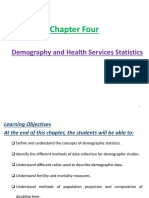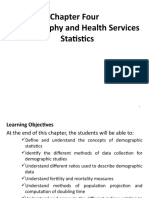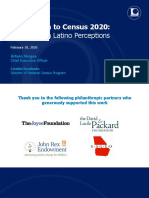0 ratings0% found this document useful (0 votes)
37 viewsIntroduction To Demography
Introduction To Demography
Uploaded by
api-240746852Demography is the study of human populations. Demographers seek to understand the characteristics and composition of populations in particular areas by collecting census data on factors like population size, growth rates, age, gender, location, and more. Censuses provide important information but can be inaccurate due to issues like homelessness, privacy concerns, or misinterpreting questions. Inaccurate data can lead to problems like unfair representation or funding levels. Most countries conduct censuses every 5-10 years due to the expense and resources required.
Copyright:
© All Rights Reserved
Available Formats
Download as PPT, PDF, TXT or read online from Scribd
Introduction To Demography
Introduction To Demography
Uploaded by
api-2407468520 ratings0% found this document useful (0 votes)
37 views8 pagesDemography is the study of human populations. Demographers seek to understand the characteristics and composition of populations in particular areas by collecting census data on factors like population size, growth rates, age, gender, location, and more. Censuses provide important information but can be inaccurate due to issues like homelessness, privacy concerns, or misinterpreting questions. Inaccurate data can lead to problems like unfair representation or funding levels. Most countries conduct censuses every 5-10 years due to the expense and resources required.
Original Title
Untitled
Copyright
© © All Rights Reserved
Available Formats
PPT, PDF, TXT or read online from Scribd
Share this document
Did you find this document useful?
Is this content inappropriate?
Demography is the study of human populations. Demographers seek to understand the characteristics and composition of populations in particular areas by collecting census data on factors like population size, growth rates, age, gender, location, and more. Censuses provide important information but can be inaccurate due to issues like homelessness, privacy concerns, or misinterpreting questions. Inaccurate data can lead to problems like unfair representation or funding levels. Most countries conduct censuses every 5-10 years due to the expense and resources required.
Copyright:
© All Rights Reserved
Available Formats
Download as PPT, PDF, TXT or read online from Scribd
Download as ppt, pdf, or txt
0 ratings0% found this document useful (0 votes)
37 views8 pagesIntroduction To Demography
Introduction To Demography
Uploaded by
api-240746852Demography is the study of human populations. Demographers seek to understand the characteristics and composition of populations in particular areas by collecting census data on factors like population size, growth rates, age, gender, location, and more. Censuses provide important information but can be inaccurate due to issues like homelessness, privacy concerns, or misinterpreting questions. Inaccurate data can lead to problems like unfair representation or funding levels. Most countries conduct censuses every 5-10 years due to the expense and resources required.
Copyright:
© All Rights Reserved
Available Formats
Download as PPT, PDF, TXT or read online from Scribd
Download as ppt, pdf, or txt
You are on page 1of 8
Introduction to Demography
Why do we study population?
the increasing population is one of the most serious issue facing the world
in order to fully understand a nation, region, province, city, etc. one must have an understanding of the characteristics of the human population in that area
What do demographers want to know?
How many people live in a given area? How is population changing? How quickly is this population change? What are the characteristics and composition of this population?
How is population distributed?
What implications do these factors have for the future?
How do demographers collect their information?
Censuses a collection of data about a population started in early Roman times Doomsday Book England 1066 one of the best known modern tallies of population collected through enumerators that go door-to-door (LDCs), or deliver censuses that are to be mailed back to the government (Canada)
What kind of information is collected?
population religion language marital status gender age home ownership household income occupation nationality education possessions
Inaccuracies with data collection
Homelessness Fear of entering slums and crime-ridden areas Isolation Confusion Privacy issues Reputation Interpretation of questions and data
Problems that result from inaccuracies
Unfair political representation Unfair levels of funding Lack of funding for homeless people Faulty economic policies Difficulty in comparing nations
How often do we conduct a census?
Frequency of censuses varies depending on the nation and their resources. It is very expensive to conduct a census and it requires a lot of people to collect the data. In Canada every 5 years The Canadian government employs 4000 (Stats Canada), 500 work in the census department. Canada hires 50,000 people on short-term contracts in a census year to work as enumerators.
You might also like
- Environmental Science: Population DynamicsDocument12 pagesEnvironmental Science: Population DynamicsJohn-Paul Mollineaux100% (1)
- Charles P. Allen High School: Section A: Short Answer Question (6 Marks)Document1 pageCharles P. Allen High School: Section A: Short Answer Question (6 Marks)api-240746852No ratings yet
- PopulationDocument11 pagesPopulationapi-378763866No ratings yet
- Chapter 7Document51 pagesChapter 7getahunasab524No ratings yet
- Sources Types, Uses of Demographic DataDocument17 pagesSources Types, Uses of Demographic DataAndrew LunguziNo ratings yet
- DemographyDocument30 pagesDemographyzodiackiller1960sNo ratings yet
- Group 1 CHS PresentationDocument59 pagesGroup 1 CHS Presentationbukharisyedaasma226No ratings yet
- PopulationDocument15 pagesPopulation0.avelynx.0No ratings yet
- Demography: Dr. Saurabh Kumar Assistant Professor Community MedicineDocument26 pagesDemography: Dr. Saurabh Kumar Assistant Professor Community Medicinedocsaurabh777No ratings yet
- Chapter 15 - Population and DemographyDocument49 pagesChapter 15 - Population and Demographyancaye1962No ratings yet
- DemographyDocument55 pagesDemographyGihan Perera100% (1)
- Dynamics of PopulationDocument16 pagesDynamics of PopulationTabeeta NoreenNo ratings yet
- Demography ch1,2 &3 UpdatedDocument69 pagesDemography ch1,2 &3 UpdatedREBUNINo ratings yet
- LECTURE 9 PopulationDocument21 pagesLECTURE 9 PopulationAman sevenElevenNo ratings yet
- Lecture 9. Population and UrbanizationDocument24 pagesLecture 9. Population and Urbanizationhelper komNo ratings yet
- Introduction To DemographyDocument16 pagesIntroduction To DemographyCherry Ng100% (1)
- DemographyDocument14 pagesDemographyMichael UrrutiaNo ratings yet
- Population GeographyDocument92 pagesPopulation GeographyChan DholNo ratings yet
- Global Demography and MigrationDocument76 pagesGlobal Demography and MigrationTaraKyleUyNo ratings yet
- CHN 2 Module 3Document79 pagesCHN 2 Module 3Alliah RodriguezNo ratings yet
- Lecture 2Document33 pagesLecture 2اسفند یار علی اکبرNo ratings yet
- Dynamics of Population EducationDocument24 pagesDynamics of Population EducationDrSyedManzoorHussain100% (1)
- Term 3 Popuation GeoDocument91 pagesTerm 3 Popuation GeoNonsindiso S. DlaminiNo ratings yet
- Rsf20presentation2013 05 10smallpdf ComDocument60 pagesRsf20presentation2013 05 10smallpdf Comapi-250489352No ratings yet
- Population Law-Chapter OneDocument28 pagesPopulation Law-Chapter OneChandrika MaharjanNo ratings yet
- Demography $ Health Statistics PDFDocument28 pagesDemography $ Health Statistics PDFAnasAbdelaNo ratings yet
- Population and Census1Document16 pagesPopulation and Census1suga29No ratings yet
- 1.20 - Comparing States & Communities PDFDocument19 pages1.20 - Comparing States & Communities PDFanacg300No ratings yet
- Population DynamicsDocument31 pagesPopulation DynamicsIqbal MuzzamilNo ratings yet
- STPM Geografi Manusia Sem 1Document14 pagesSTPM Geografi Manusia Sem 1EagelNo ratings yet
- Population and DemographyDocument143 pagesPopulation and DemographyAminas PaikaNo ratings yet
- 1.3 - Major Sources of Population DataDocument13 pages1.3 - Major Sources of Population DataGaurav JhaNo ratings yet
- Chapter Four Demography and Health Services StatisticsDocument76 pagesChapter Four Demography and Health Services StatisticsDAWITNo ratings yet
- Population Geography I: The Where and Why of Population - Density - Distribution - Demographics - DynamicsDocument70 pagesPopulation Geography I: The Where and Why of Population - Density - Distribution - Demographics - Dynamics5joanNo ratings yet
- Countdown To Census 2020: New Data On Latino PerceptionsDocument51 pagesCountdown To Census 2020: New Data On Latino PerceptionsLatino RebelsNo ratings yet
- DS 113 Module 4 Population&DvtDocument57 pagesDS 113 Module 4 Population&DvtKELVIN MAIMUNo ratings yet
- Geography WeatherDocument12 pagesGeography WeathermerchantbaqirNo ratings yet
- Unit 7Document114 pagesUnit 7bereketNo ratings yet
- PEED All GovernanceDocument439 pagesPEED All GovernanceGetuNo ratings yet
- Lecture 3 - Demographic Data and MethodsDocument12 pagesLecture 3 - Demographic Data and MethodsLAURA TERRES CABALLERONo ratings yet
- PHS 101 - Unit One and Two. July 2022Document55 pagesPHS 101 - Unit One and Two. July 2022Kelebogile HlomaNo ratings yet
- GR10 Term 3 & 4 LearnerDocument48 pagesGR10 Term 3 & 4 LearnertongmasegowNo ratings yet
- لقطة شاشة ٢٠٢٤-٠٥-٠٨ في ٧.٤٢.٤٤ مDocument108 pagesلقطة شاشة ٢٠٢٤-٠٥-٠٨ في ٧.٤٢.٤٤ مq4px8jdxpfNo ratings yet
- Human Population and The EnvironmentDocument27 pagesHuman Population and The EnvironmentEmon ChowdhuryNo ratings yet
- Sources of Data: - Demographic Data Cover: - Demographic Events IncludeDocument27 pagesSources of Data: - Demographic Data Cover: - Demographic Events Includesafraj5003No ratings yet
- Multicultural Society: Revision Seminar 2021-2022 Sierra StopperDocument16 pagesMulticultural Society: Revision Seminar 2021-2022 Sierra StopperKubo PitonakNo ratings yet
- Chapter 2 PopulationDocument15 pagesChapter 2 PopulationKatyusha FioreNo ratings yet
- Demography PGDPHMDocument200 pagesDemography PGDPHMVinay KumarNo ratings yet
- Census of India 2011 DataDocument66 pagesCensus of India 2011 Datasunil601100% (1)
- Demography BasicsDocument27 pagesDemography BasicsRakersh PatidarNo ratings yet
- MohapatraClassNotes SociologyOptional Vajiram&Ravi KING R QUEENDocument1,250 pagesMohapatraClassNotes SociologyOptional Vajiram&Ravi KING R QUEENctetsachinraiNo ratings yet
- Studyguide360: Chapter-3 Population CompositionDocument6 pagesStudyguide360: Chapter-3 Population CompositionAbhijeet ParasharNo ratings yet
- SOC476 - Demography Midsem SlidesDocument205 pagesSOC476 - Demography Midsem SlidesRaman MalaniNo ratings yet
- Unit-6 Demography Full UnitDocument240 pagesUnit-6 Demography Full UnitKairali puthoor100% (1)
- Gr10 Term3 0 4 Teacher Final Doc Edward-2Document68 pagesGr10 Term3 0 4 Teacher Final Doc Edward-2Naledi MokoenaNo ratings yet
- 8 - Influx of MigrantsDocument15 pages8 - Influx of MigrantsElden TingNo ratings yet
- B1 12 Geography Key Notes CH 03 Population CompositionDocument5 pagesB1 12 Geography Key Notes CH 03 Population CompositionSankalp KumarNo ratings yet
- 3009 - Week 7 Population CensusDocument4 pages3009 - Week 7 Population Censusfayiahrobert7No ratings yet
- Global MigrationDocument20 pagesGlobal MigrationKenneth Michael Antipolo FelisildaNo ratings yet
- The Myth of Millionaire Tax Flight: How Place Still Matters for the RichFrom EverandThe Myth of Millionaire Tax Flight: How Place Still Matters for the RichNo ratings yet
- Aboriginal Populations: Social, Demographic, and Epidemiological PerspectivesFrom EverandAboriginal Populations: Social, Demographic, and Epidemiological PerspectivesNo ratings yet
- Canada and The Cold WarDocument9 pagesCanada and The Cold Warapi-240746852No ratings yet
- North American DefenceDocument11 pagesNorth American Defenceapi-240746852No ratings yet
- New World Order!?!Document15 pagesNew World Order!?!api-240746852No ratings yet
- Cold War ConfrontationsDocument10 pagesCold War Confrontationsapi-240746852No ratings yet
- Term Project 2013-2014: Urbanization Photo EssayDocument1 pageTerm Project 2013-2014: Urbanization Photo Essayapi-240746852No ratings yet
- Charles P. Allen High School: 2013-2014 Semester Two Global Geography 12 Final Exam PreviewDocument1 pageCharles P. Allen High School: 2013-2014 Semester Two Global Geography 12 Final Exam Previewapi-240746852No ratings yet
- Document Analysis - Opvl: OriginDocument2 pagesDocument Analysis - Opvl: Originapi-240746852No ratings yet
- Resource Case Study Comparison In-Class Assignment: Types Issue SolutionsDocument2 pagesResource Case Study Comparison In-Class Assignment: Types Issue Solutionsapi-240746852No ratings yet
- Chapter Five Questions Canada's Role in World War II: Part One: Answer The FollowingDocument1 pageChapter Five Questions Canada's Role in World War II: Part One: Answer The Followingapi-240746852No ratings yet
- Canadian History XIDocument22 pagesCanadian History XIapi-240746852No ratings yet
- Population ProblemsDocument14 pagesPopulation Problemsapi-240746852No ratings yet
- Demographic Transition Model: Stage 1 Stage 2 Stage 3 Stage 4 Stage 5Document1 pageDemographic Transition Model: Stage 1 Stage 2 Stage 3 Stage 4 Stage 5api-240746852No ratings yet
- Global Geography 12 C.P. Allen High School: Six Concepts of GeographyDocument1 pageGlobal Geography 12 C.P. Allen High School: Six Concepts of Geographyapi-240746852No ratings yet
- Six Factors Leading To ConfederationDocument17 pagesSix Factors Leading To Confederationapi-240746852No ratings yet
- UntitledDocument48 pagesUntitledapi-240746852No ratings yet
- Global Geography 12 C.P. Allen High School Global Geography 12 Independent Study SeminarsDocument2 pagesGlobal Geography 12 C.P. Allen High School Global Geography 12 Independent Study Seminarsapi-240746852No ratings yet
- Cold War Seminars: Canadian History 11Document2 pagesCold War Seminars: Canadian History 11api-240746852No ratings yet
- What It Is and How It WorksDocument8 pagesWhat It Is and How It Worksapi-240746852No ratings yet
- Global Geography 12 C.P. Allen High School: GGS 12 Map Assignments and QuizzesDocument2 pagesGlobal Geography 12 C.P. Allen High School: GGS 12 Map Assignments and Quizzesapi-240746852No ratings yet
- Global Geography 12 C.P. Allen High School: Group Challenge!Document4 pagesGlobal Geography 12 C.P. Allen High School: Group Challenge!api-240746852No ratings yet
- Charles P. Allen High School: Student Population Census AssignmentDocument1 pageCharles P. Allen High School: Student Population Census Assignmentapi-240746852No ratings yet
- Global Geography 12 C.P. Allen High SchoolDocument1 pageGlobal Geography 12 C.P. Allen High Schoolapi-240746852No ratings yet
- The American RevolutionDocument17 pagesThe American Revolutionapi-240746852No ratings yet
- Infectious Diseases & Natural DisastersDocument22 pagesInfectious Diseases & Natural Disastersapi-240746852No ratings yet
- The War of 1812: Canadian History 11Document35 pagesThe War of 1812: Canadian History 11api-240746852No ratings yet
- Rebellions of 1837: Upper and Lower Canada: Textbook Q&A Pages 159-161Document1 pageRebellions of 1837: Upper and Lower Canada: Textbook Q&A Pages 159-161api-240746852No ratings yet
- BiodiversityDocument20 pagesBiodiversityapi-240746852No ratings yet
- Global Geography 12 C.P. Allen High School Pollution WebquestDocument1 pageGlobal Geography 12 C.P. Allen High School Pollution Webquestapi-240746852No ratings yet
- The Royal Proclamation (1763)Document8 pagesThe Royal Proclamation (1763)api-240746852No ratings yet

























































































